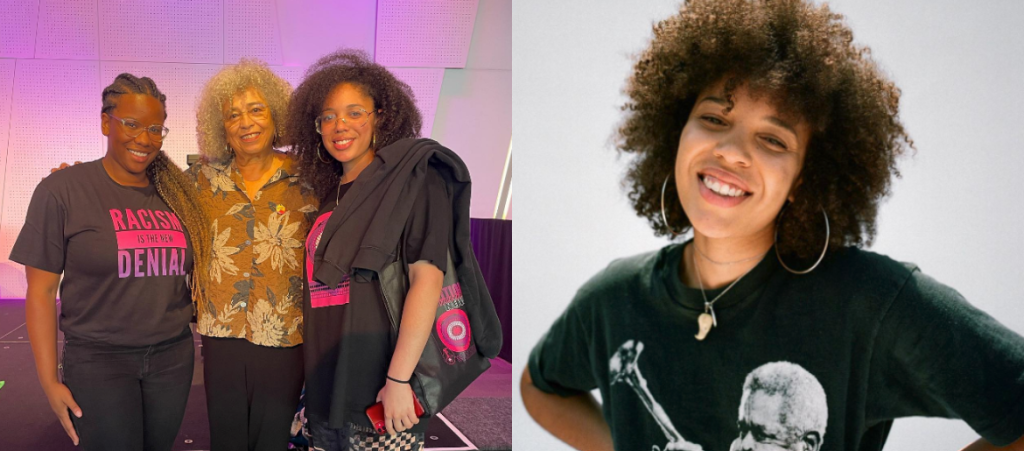
There are over 40,000 children in Australia who have a parent in prison, yet there are no formal support services set up by the same system that takes their loved ones away. Parental incarceration can have a profound and long-lasting impact on young adults – the emotional, psychological, and financial burdens placed on these individuals can shape their lives for years to come. In NSW, one in six adults in prison and more than half of young people in youth justice centres reported that a parent had been imprisoned. Where to begin tackling such an immense challenge? Maia Ihemeje is giving it a shot, creating new organisation Yung Prodigy dedicated to supporting young people experiencing parental incarceration.
Maia grew up in a household with parental incarceration herself, so knows how it impacts so many aspects of life. “My father has been in and out basically my whole life. We grew up with police at the door a lot of the time. When the main breadwinner leaves the home, financial responsibilities are now brought upon the children. Your mental [health] is all over the place, your stability is just completely shaken up and you have to enter into the roles of a parent and being that for yourself. At a young age I had to be a father figure, mentor, confidant, all of those things. How do you communicate this to younger children? Or your younger siblings? How do you navigate this real complex topic?”
Maia was eight years old when parental incarceration first affected her life; at 25 she says it still impacts her to this day. “It never leaves you, being in contact with the justice system. It can almost feel like you are part of it… Like you’re being questioned. Am I saying the wrong things? You’re questioning yourself. Is my phone being tapped? Do I have to attend court?” she says.
Maia explains the kids of imprisoned parents are “invisible victims”, as they also become part of the justice system and its processes. “People centre [incarceration] on that individual, but they may be a father, a mother, or a brother, a mentor, a caregiver, a confidant… Once you remove them from their ecosystem, it can actually create more problems for the people that know. There are ripple effects.”
Unbelievably (or believably, depending on your faith in government) there is no formal support system for children with a parent in prison, despite it being the subject of multiple inquiries and reports over the past 20 years. When I asked Maia if she would have liked more support from the government when she was growing up, she redirected my thinking. “I don’t necessarily agree with the way that colonial institutions and structures go about things. Yung Prodigy’s vision for the future is that we have our own system outside of that, completely led and run by us.” The organisation’s goal is to help build support networks through communities and other organisations in the space.
For Yung Prodigy, that means supporting young people with a decolonised approach – instead of dictating what they need, asking and connecting them with resources to do it. “Actually speaking to people with lived experience, to young people and bringing them on the journey of creating the campaigns, projects and programs because they know what they need. The current system would never give X amount of dollars to a young person living this experience, but we want to get rid of that middleman and give resources directly to people to create the solutions they are looking for.”
The first initiative is a retreat for young people who have experienced parental incarceration, providing a safe space to share about a topic that much of society doesn’t understand. Maia hopes the retreat will be a chance to map out the future of Yung Prodigy through co-design. “I feel like a lot of the time people say ‘let’s do co-design’ but they just mean to consult, extract information, and then never interact with that community again. We want to go through that whole process – we’ve engaged with you, this is what you’ve identified as a problem, we’ve now identified solutions, let’s execute that solution together. So we hope that through different activities and being a bit more creative it will stimulate ideas and ways to address parental incarceration through advocacy, programs or projects, whatever that may look like.”
While Yung Prodigy is still very new, having youth-forward voices in the space is important. So is the fact that it’s being led by someone who knows the journey all too well and is determined to build a supportive community around this ‘taboo’ experience. “Your feelings are completely valid; your life has been completely infiltrated and it’s out of your hands. You’re going to be questioning yourself, and that’s completely normal,” Maia says. “Through avenues like Yung Prodigy you can meet people with some of the same experiences as you.” And in the absence of guidance from the very system that caused these challenges to begin with, coming together is the best way forward.
Smart people read more:
About 43,000 Australian kids have a parent in jail but there is no formal system to support them – The Conversation
Support For Children of Imprisoned Parents in New South Wales – Deadly Connections
8 Books Exploring The Impact of Colonialism – Both Fiction & Non-Fiction

Comments are closed.